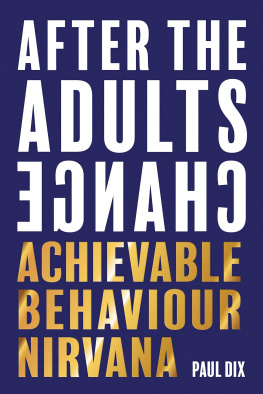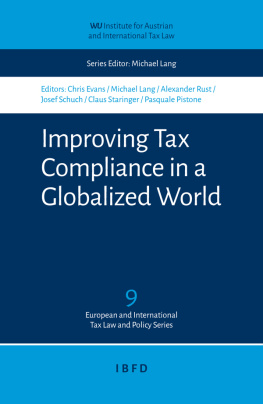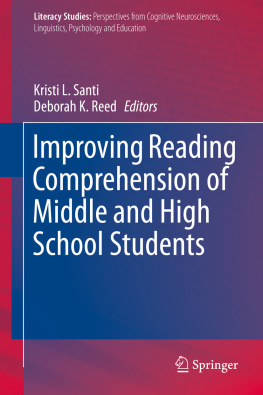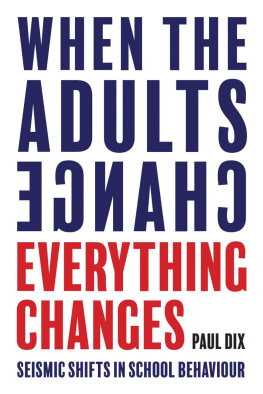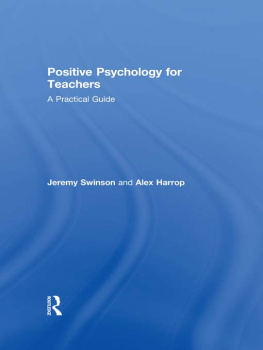Watkins Chris - Improving School Behaviour
Here you can read online Watkins Chris - Improving School Behaviour full text of the book (entire story) in english for free. Download pdf and epub, get meaning, cover and reviews about this ebook. year: 2000, publisher: SAGE Publications, genre: Politics. Description of the work, (preface) as well as reviews are available. Best literature library LitArk.com created for fans of good reading and offers a wide selection of genres:
Romance novel
Science fiction
Adventure
Detective
Science
History
Home and family
Prose
Art
Politics
Computer
Non-fiction
Religion
Business
Children
Humor
Choose a favorite category and find really read worthwhile books. Enjoy immersion in the world of imagination, feel the emotions of the characters or learn something new for yourself, make an fascinating discovery.

- Book:Improving School Behaviour
- Author:
- Publisher:SAGE Publications
- Genre:
- Year:2000
- Rating:5 / 5
- Favourites:Add to favourites
- Your mark:
- 100
- 1
- 2
- 3
- 4
- 5
Improving School Behaviour: summary, description and annotation
We offer to read an annotation, description, summary or preface (depends on what the author of the book "Improving School Behaviour" wrote himself). If you haven't found the necessary information about the book — write in the comments, we will try to find it.
Improving School Behaviour — read online for free the complete book (whole text) full work
Below is the text of the book, divided by pages. System saving the place of the last page read, allows you to conveniently read the book "Improving School Behaviour" online for free, without having to search again every time where you left off. Put a bookmark, and you can go to the page where you finished reading at any time.
Font size:
Interval:
Bookmark:
Improving School Behaviour
Chris Watkins and Patsy Wagner

Copyright 2000 Chris Watkins and Patsy Wagner
First published 2000
All rights reserved. No part of this publication may be reproduced, stored in a retrieval system, transmitted or utilized in any form or by any means, electronic, mechanical, photocopying, recording or otherwise, without permission in writing from the Publishers.
 | Paul Chapman Publishing Ltd A SAGE Publications Company 6 Bonhill Street London EC2A 4PU SAGE Publications Inc. 2455 Teller Road Thousand Oaks, California 91320 SAGE Publications India Pvt Ltd 32, M-Block Market Greater Kailash-I New Delhi 110 048 |
British Cataloguing in Publication Data
A catalogue record for this book is available from the British Library
ISBN 0-7619-6336-7
ISBN 0-7619-6337-5 (pbk)
Library of Congress catalog card number available
Typeset by Anneset, Weston-super-Mare, Somerset
Printed and bound in Great Britain by Athenaeum Press, Gateshead
Dedication:
To all those who have talked out of turn
and, at least once a week,
made unnecessary (non-verbal) noise;
and to Douglas, Etta and Fred,
three great improvers.
Figures
Tables
Welcome to this text. We intend you to find it useful.
As a whole in this book we aim to offer you ideas, arguments and examples which will allow you to see issues of school behaviour in the most constructive way possible, and to think through some appropriate forms of action to follow. Is that what you were expecting? Take a moment, if you will, to unearth any expectations you have as you start this text: not only will this help to activate your reading, but it might also help you gather your skills of handling disappointment! not everything you might expect will be found herein.
In the first chapter we have to consider how behaviour is explained, since this has a major knock-on effect as to how action is devised. In schools we are surrounded by different forms of explanation, some of them more productive than others. Improving school behaviour can mean improving the explanations. This chapter also brings forward the evidence which supports the multi-level approach we adopt.
addresses an area which some teachers baulk at school behaviour. Its not the school that behaves, its the pupils they say to us. We disagree and consider the way that different schools behave, together with how aspects of the school as an organization influence the patterns of pupil behaviour. Improving school behaviour can involve a range of action at this level, and is generally much more productive than making up reactive school policies.
The classroom is one of the most complex social situations on Earth, and this has to be understood before we can think sensibly about approaches to improvement distils much research about the many factors which influence classroom behaviour, and leads to a diagnostic framework.
In adopting a multi-level approach we do not ignore the individual, and offers frameworks and examples for making sense of patterns of behaviour at this level. It also leads into thinking which can help to develop appropriate action, and which links up to other levels of action when needed.
Finally, of the frameworks from earlier chapters and on extra focus on process, working relationships can be developed to minimise difficult school behaviour.
As the above outline may have indicated, the order of chapters is deliberate. We feel you will get most out of the book by gaining a sense of the important perspective in . But we recognize that many readers will want to go straight to a chapter which interests them we do this ourselves as readers. Perhaps the best we can hope for is that you might read this book in a similar way to how A S Byatt describes her reading of a novel a quick skim to find out the main plot, followed by a more detailed read of the episodes which attract.
We do hope you will use this book, and that you might do more than read it. We hope we have presented ideas and practices which you can adapt into your own practice, and we hope to regularly encourage you to talk about what you have read (and done) with your colleagues. That is the way that change really happens.
We have a because of reason and an in order to reason. We write because of the many occasions when we see matters of behaviour handled in ways which make things worse. A school might formalize a reactive policy which leads to more exclusions; a classroom teacher might tighten up discipline and worsen the learning relationships; another colleague might handle interactions with a particular pupil in such a way that their dignity is eroded rather than enhanced. On all such occasions the outcome is not what anyone really wants. It could be otherwise, even in the busy and crowded place we call school. So we write to put in place some constructive alternatives.
Twelve years ago we wrote a text which had some similar structural features to this book: a multi-level view to create a whole-school approach. Part of our motivation then was to combat the distortion of pastoral care systems into discipline dustbins, and to move beyond the prevalent within-person explanations for difficulties. Those motivations remain, and have been enhanced by our experiences and what we have learned from them over the intervening years.
The knowledge base which informs this book comes from the work and thinking we have been involved in for many years. Chris Watkins is a senior lecturer at the University of London Institute of Education, and has run many courses in the area of school behaviour. He has facilitated dozens of school in-service days on the theme, regularly hearing the comment thats the best day weve ever had. Working with teachers at higher degree level on this theme means that he has to be up to date with the international research evidence. Patsy Wagner is an educational psychologist in Kensington and Chelsea who has pioneered a consultation-based approach for education psychology services working with schools, and works closely with teachers and parents in a multi-level way. She is regularly involved in consultations with teachers, and sometimes with parents, on many concerns some of which may include the difficult behaviour of individuals, groups and classes. But for both authors, the theme of behaviour is one strand of our work, which is as it should be. We are sceptical about any job which is completely devoted to behaviour, since it appears to say that this focus is a goal in itself. It is not. We work in this area in order to release peoples energies for the real work: effective learning, good tutoring, positive personal-social development, and so on.
Over the years, we have been privileged to work with many colleagues in England, Wales, Scotland and Northern Ireland, as well as Hong Kong and Norway. Our publications have been translated into Spanish and Cantonese. Throughout these experiences, we have learned how to improve the ideas and how we communicate them. We have also learned the limitations of what we offer.
The life of educators in many developed countries has increasingly become the focus for hostile comment over recent decildes. This book is not part of that trend. When we say improving school behaviour we are not criticising you or your school; we are merely setting out the ground things could be better. As colleagues in school improvement have often remarked, You dont have to be ill to get better. So we feel that nearly every school situation in which we find ourselves could be better, and as a result pupils, teachers and others would feel better about their work, relationships and achievements.
Next pageFont size:
Interval:
Bookmark:
Similar books «Improving School Behaviour»
Look at similar books to Improving School Behaviour. We have selected literature similar in name and meaning in the hope of providing readers with more options to find new, interesting, not yet read works.
Discussion, reviews of the book Improving School Behaviour and just readers' own opinions. Leave your comments, write what you think about the work, its meaning or the main characters. Specify what exactly you liked and what you didn't like, and why you think so.

